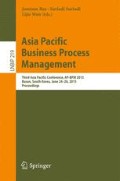Abstract
In enacting a workflow process that is made up of stepwise activities and their temporal orderings, it is very important to control and trace each instance’s execution as well as to keep it sustainable. In particular, the sustainability implies that the underlying system should be able to not only provide an error-detection functionality on its running exceptions but also to furnish a very autonomous recovery mechanism to deal with the detected exceptional and risky situations. As an impeccable technique for realizing the sustainability on workflow process enactment services, this paper tries to formalize a workflow risk-recovery concept to be used in implementing autonomous recovery mechanisms of workflow enactment systems, which is named as gateway-centered rollback-points ancestry model. Conclusively, we believe that the proposed model ought be one of those impeccable trials and pioneering contributions to improve and advance the sustainability in workflow process enactment services.
This research is mainly supported by the Contents Convergence Software Research Center funded by the GRRC Foundation of Gyeonggi Province, South Korea.
Access this chapter
Tax calculation will be finalised at checkout
Purchases are for personal use only
References
Ellis, C. A.: Information control nets: a mathematical model of information flow. In: ACM Proceedings of the International Conference on Simulation, Modeling and Measurement of Computer Systems, pp. 225–240. ACM (1979)
Podgurski, A., Clarke, L.A.: A formal model of program dependencies and its implications for software testing, debugging, and maintenance. IEEE Trans. Software Eng. 16(9), 965–979 (1990)
Ellis, C. A., Nutt, G. J.: The modeling and analysis of coordination systems. University of Colorado/Dept. of Computer Science Technical report, CU-CS-639-93 (1993)
Ellis, C. A.: Formal and informal models of office activity. In: Proceedings of the 1983 Would Computer Congress, Paris (1983)
Kim, K., Ellis, C.A.: Workflow Reduction for Reachable-path Rediscovery in Workflow Mining. Series of Studies in Computational Intelligence, Foundations and Novel Approaches in Data Mining, Springer, Heidelberg (2006)
Kim, K.-H.: A process-driven inter-organizational choreography modeling system. In: Meersman, R., Tari, Z. (eds.) OTM-WS 2005. LNCS, vol. 3762, pp. 485–494. Springer, Heidelberg (2005)
Park, M., Kim, K.: Control-path oriented workflow intelligence analyses. J. Inf. Sci. Eng. 24(2), 343–359 (2008)
Kim, K., Ra, I.: e-Lollapalooza: a process-driven e-business service integration system for e-logistics services. KSII Trans. Internet Inf. Syst. 1(1), 33–51 (2007)
Kim, K.: A model-driven workflow fragmentation framework for collaborative workflow architectures and systems. J. Netw. Comput. Appl. 35(1), 97–110 (2012)
Chun, M., et al.: Analyzing risk dependencies on rfid-driven global logistics processes. In: The Proceedings of the ACIS/JNU International Conference on Computers, Networks, Systems, and Industrial Engineering, pp. 59–64 (2011)
Maa, J., Wangc, K., Lida, X.: Modelling and analysis of workflow for lean supply chains. Enterp. Inf. Syst. 5(4), 423–447 (2011)
Ghadge, A., Chester, M., Kalawsky, R.: A systems approach for modeling supply chain risks. Supply Chain Manag. Int. J. 18(5), 523–538 (2013)
Author information
Authors and Affiliations
Corresponding author
Editor information
Editors and Affiliations
Rights and permissions
Copyright information
© 2015 Springer International Publishing Switzerland
About this paper
Cite this paper
Park, M., Ahn, H., Kim, H., Kim, K.P. (2015). A Gateway-Centered Workflow Rollback-Points Ancestry Model for Sustainable Workflow Enactments. In: Bae, J., Suriadi, S., Wen, L. (eds) Asia Pacific Business Process Management. AP-BPM 2015. Lecture Notes in Business Information Processing, vol 219. Springer, Cham. https://doi.org/10.1007/978-3-319-19509-4_3
Download citation
DOI: https://doi.org/10.1007/978-3-319-19509-4_3
Published:
Publisher Name: Springer, Cham
Print ISBN: 978-3-319-19508-7
Online ISBN: 978-3-319-19509-4
eBook Packages: Computer ScienceComputer Science (R0)

